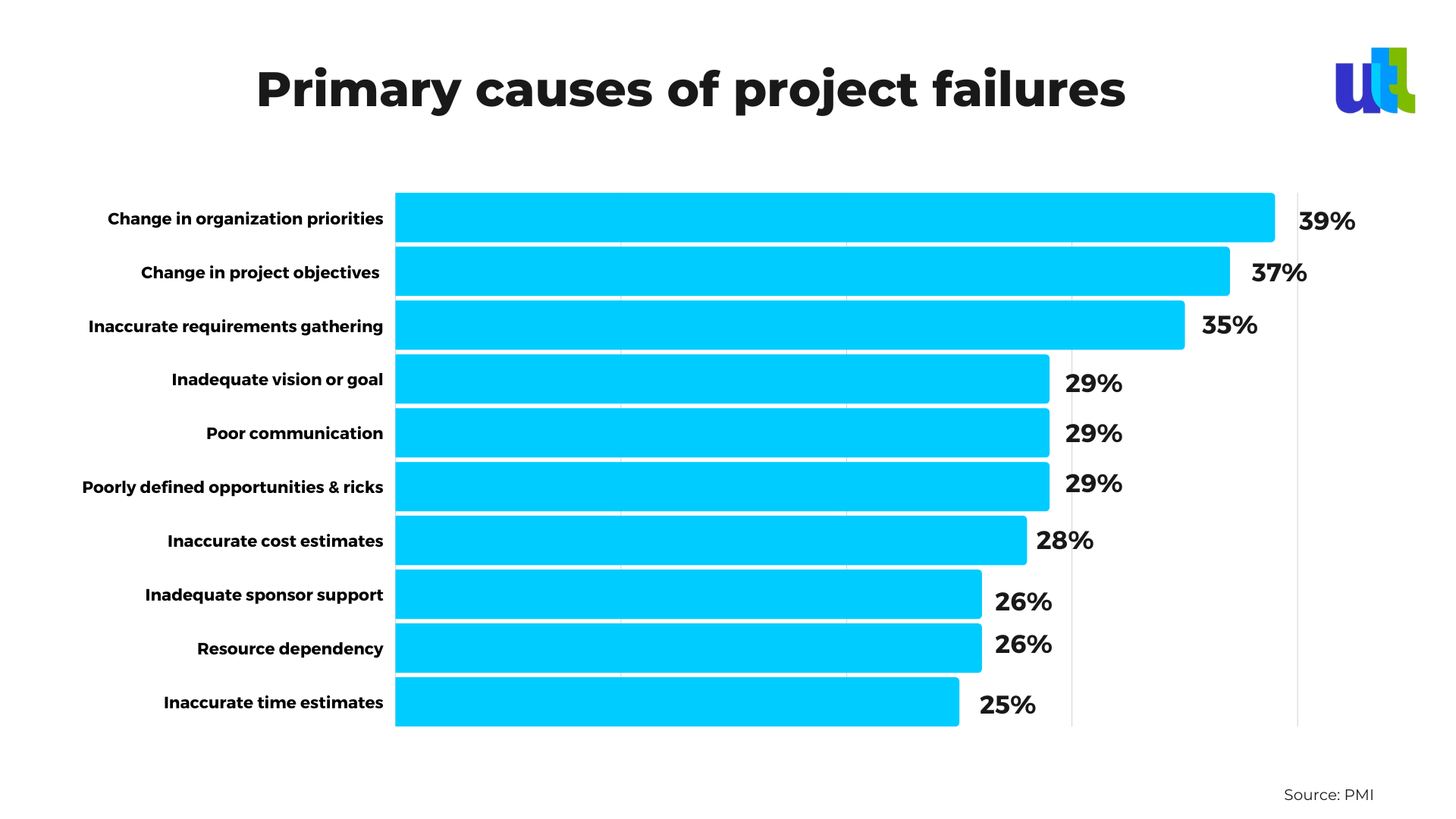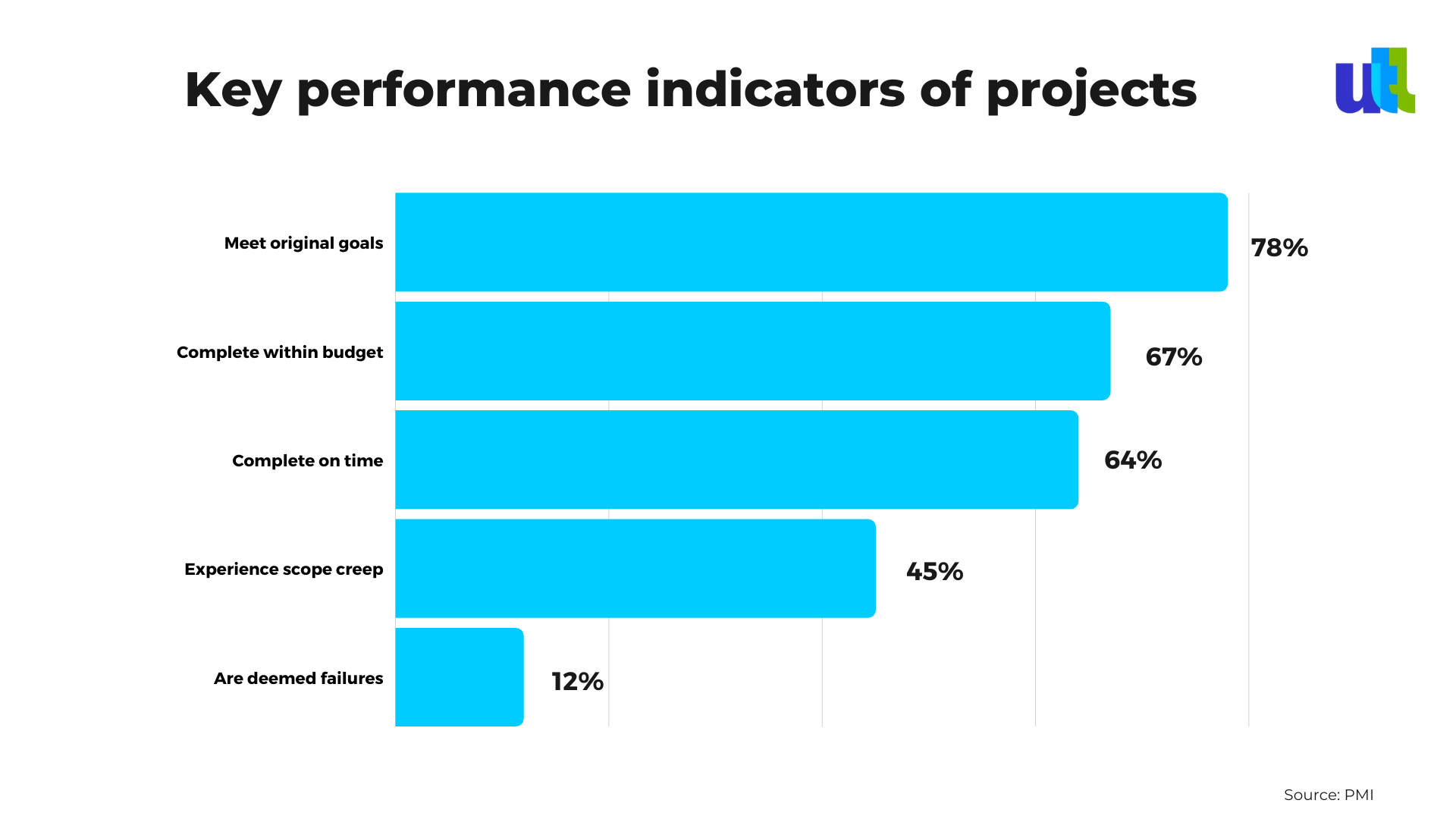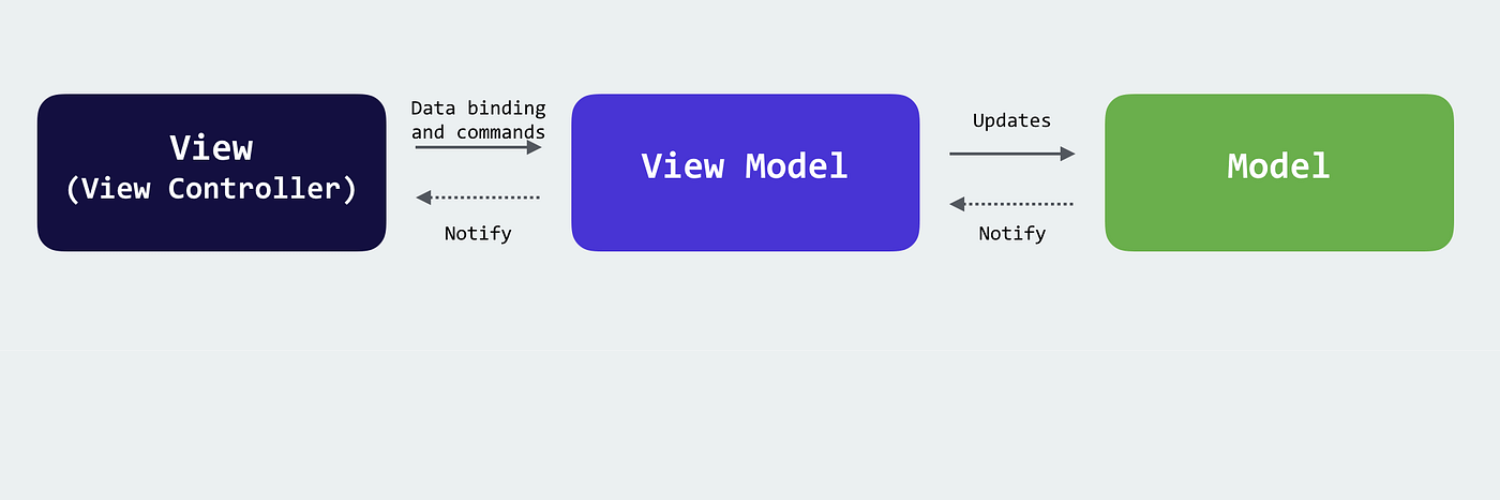While you are probably still angry with your last software development agency because they were not able to deliver your dream project or you’re still wondering what went wrong with your product development, we wish to remind you that you are not alone.
Based on the analysis of 50,000 projects globally, 66-75% of technology projects end up in partial or total failure. Less than a third of all projects were successfully completed on time and on budget over the last year, for example. Why do so many software projects fail?
Usually, a project is considered as “failed” when it does not meet expectations around deliverables, outcomes, budget, or (sometimes) has a serious lack of involvement from Senior Management. In this article, we will share the 12 most common red flags which may indicate that your software project is likely to fail.

1. Over promising just to close the deal
Any good relationship is based on trust and keeping your promises. If companies overpromise just to win the contract, they’ll most likely end up under-delivering.
Pitfall Avoidance: The recommended approach is to review the project’s scope with the user community and obtain 100% buy-in to what is about to be done and delivered.
Designing the “perfect” solution with a very broad scope frequently leads to confusion and multi-year projects with complex interdependencies. When possible, it is better to limit the scope to achievable, well-defined efforts. This way, the organization can do a better job also of monitoring progress and controlling outcomes.
2. Not gather the right team from the start
The 2021 Project Management Report shows that approximately 70% of all project teams are made of a maximum of 10 members, while 53% of respondents from Wellingtone’s 2021 The State of Project Management report believe that even more projects will be carried out by small informal teams in the future.
It is important to establish (and limit) the number of people involved in the project from day one. It’s crucial to scope the project, know how many team members, which talents and skills are required to successfully complete it. But never overestimate what a small team can do, when the project is huge.
3. No detailed planning
Now that you have built your team, identifying its priorities before you actually get started can help you avoid failure by keeping everyone focused on what matters the most. Many software projects are late or fail due to the lack of good coordination and detailed planning.
While one of the main goals of project management is to strive to plan for all kinds of problems and outcomes, produce a solid and viable PM, and, thus, reduce expenses, poor PM Planning Results in 11.4% of An Organization’s Resources Being Wasted (Paramount, 2022).
Furthermore, according to Finances Online research, poorly defined risks and not enough time dedicated to this task cause 29% of project failures.
Teams need to implement the bottom-up planning process that identifies connections between deliverables and includes estimates also from the engineers themselves. Then, daily 15 minute stand-up meetings can be started: where all the issues are surfaced, new possible risks are identified and managed, and most importantly - goals for the day are set.
4. Poor to no communication
At its core, project management is all about communication.
In fact, 67% of projects fail due to the undervaluation of project management (Paramount, 2022).
Every team member relies on consistent access to the information they need or must have, both from their project manager and their colleagues. Without clear and effective communication, employees might get confused easily, not know what needs to be done and who’s in charge of what.
5. Lack of monitoring and control
Monitoring the progress effectively and controlling the outcomes as needed is crucial to minimize the chance of a project’s failure. It is important to keep in mind that project management starts with a lot of groundwork: from creating a schedule to outlining the budget and assigning tasks. But keeping the project on track as it moves forward is just as important. To do that, project managers need to stay informed, communicate the tasks clearly, keep track of progress and be aware of any possible and existing issues that need to be addressed before they cause any unwanted outcomes.
6. Lack of discipline
If we are building an app and keep constantly changing the core and major parts of it, the project budget might easily spiral out of control, while each deadline might be missed and it may seem like the project will never be finished.
In fact, according to Statista (2022), 48% of software projects fail due to changing or poorly documented requirements and tasks.
That is why we need to have discipline - to follow the project's detailed plans.
We create a vision of what project success looks like and we follow it. Every other great idea can be considered and/or implemented during the next phase of the project.
7. Not being aware of scope creep
Creating a ‘Scope’ is a quick way to describe all the hard work that’s included in the project — goals, deliverables, deadlines, and specific tasks. If that scope keeps expanding, little by little you start experiencing a so-called “scope creep”: when more and more work keeps getting added to the team's list of tasks. That way they’re being set up for failure before they even start since the workload will keep piling up, the goals will be achieved slowly, and the project will take too much time. And here is another piece of statistics confirming it: 22% of unsuccessful software projects missed the initial delivery timeline expectations (Statista, 2022).
That is why it’s important to plan well, keep discipline, and set priorities.
8. Insufficient resources
Facts - you can’t make something out of anything. If your team doesn’t have enough resources to work with, you can’t expect good outcomes from your project. ‘Resources’ is anything that has importance to your project: funding, raw materials, professional software, and people. All resources have one thing in common - they’re essential to complete your project. That is why in order for a project to be successful, you should make sure you listen to your client and team, evaluate it, and fulfill the fundamental needs.
Underfunding and under resourcing cause 40% of software project failures (Statista, 2022). Is the risk worth it?
9. Lack of industry exposure
Sometimes you may end up hiring a team who does not have any previous exposure to the same industry or domain. That increases the learning curve making it quite long while they also build your project based mostly on theoretical knowledge which becomes counterproductive. According to Timo O.A. Lehtinen’ research on software projects, 18.1 % of all projects fail due to the lack of instructions and experience in the industry.
It's always better to hire a team who has already worked in the same domain. It's a safe bet.
10. No or little knowledge how to handle an application that scales fast
It's a typical problem for small teams who have never worked for a big enterprise. They do not have enough experience to handle a growing database, such as an order data-table in thousands. When data grows beyond a million, applications start to become sloppy and you risk losing your customers fast. Here you can only count on a team who has previously seen such incidents.
11. Lack of data and application security may kill your business overnight
Some developers are not experienced enough to encrypt sensitive data like SSN, driver's license, or some payment related data well. A data hack that is quite common nowadays may bring your business at a stake overnight. This might happen because your customers will not wait to sue you if their credit card is charged due to the data leak from your application.
12. Not having access to the end user of the product
The final user is the most important stakeholder. Anything built without their participation leaves you with no real feedback. You might even end up experiencing a complete misfit - when your product does not correspond to the needs of the original user of the software product.

These were the 12 major red flags that explain “Why lots of software projects fail”. However, there are many more factors that must be considered for a software development project. At Utah Tech Labs, thanks to our vast experience and constant research, we are able to notice any small issue before the failure happens.
We can help your software project not sink.
Learn more about:
A guaranteed formula for a successful software product development.
----------------------------------------------------------------------------------------------
View the full presentation:
WRITTEN BY
Migle Olenceviciute
2022-09-13














































































































































































